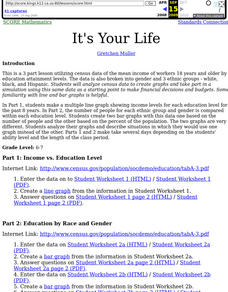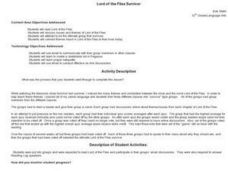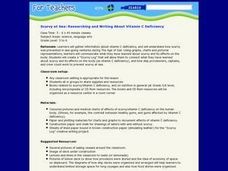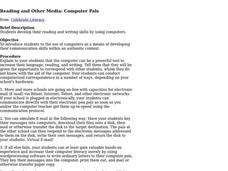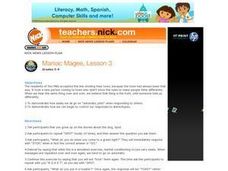PBS
An Attack on Syria- What Would You Do?
Has United States military intervention in the conflicts of other countries always been warranted? After reviewing a brief background on contemporary US conflicts and reading articles describing the civil war in Syria, your learners...
Curated OER
Elements of Art: Student Assessment
What a neat test! The class is asked to draw and color to create examples of eight elements of art. They focus on each element (line, value, shape, form, space, texture, primary and secondary color) by creating an original piece in each...
Curated OER
Bears' House Vandalized, Witnesses Say Blonde Girl Spotted Fleeing from the Scene
Students explore journalism. In this expository writing activity, students read several newspaper articles and note common features. After reading Goldilocks and the Three Bears by Jan Brett, students work with a partner to write a...
Curated OER
Courts in the Classroom: Ritter v Stanton
Students read the case briefs of Ritter v Stanton. They simulate the trial with classmates taking various parts such as appellant, appellee, bailiff, and justices. After conducting a mock argument, they write their own opinion for the case.
Curated OER
Migration Activation
Students play the role of migrating birds. As a class, they simulate a migration of birds to one place and back again. They relate their habitat size and changes to their current population numbers. They discover the many dangers of...
Curated OER
It's Your Life
Students make a multiple line graph showing income levels for each education level for the past 8 years and the number of people for each ethnic group and gender is compared within each education level.
Curated OER
Archaeology: Digging in the Classroom
Young scholars explore how an archaeologist works and makes discoveries. In this archaeology lesson, students participate in a simulation in which they excavate broken pottery. Young scholars use measurement, geometry, and observation...
Curated OER
Theoretical Quantum Physics... For Kids!
Students explore quantum physics by participating in several class activities. In this space-time lesson, students discuss the concepts of time traveling and the anatomy of an atom. Students draw geometric figures and utilize string to...
Curated OER
Molecular Approaches to Evolution
Students examine the molecular studies of organisms that have led to a new era in their understanding of speciation and evolutionary relationships. Students study the allelic frequency of genes controlling specific molecules and assess...
Curated OER
Lord of the Flies Survivor
Twelfth graders read and discuss the story elements and themes of the novel, Lord of the Flies. They simulate survivor groups through quizzes and voting off the group with the lowest scores, and group e-mail discussions.
Curated OER
Ocean Exploration
Students explore a simulated ocean floor. For this environmental lesson plan, students take on roles of an ocean dive team exploring the ocean floor. Dive logs will be created and the students will explore their sections of simulated...
Curated OER
Modeling Martian Motion
Learners explore the difference between stars and planets and take on the role of these objects to simulate the relative motions of Mars and the Earth around the Sun.
Curated OER
Curiosity Shop
First graders simulate shopping for needs and wants. In this money instructional activity, 1st graders examine Norman Rockwell's painting "Curiosity Shop." Students role-play shopping in a store and making purchases.
Curated OER
Scurvy at Sea: Researching and Writing About Vitamin C Deficiency
Students gather information about vitamin C deficiency, and research how scurvy was prevented in sea-going ventures during The Age of Sail. They create a "Scurvy Log" that will allow them to connect what they have learned about scurvy...
Curated OER
WWII Economics
Learners simulate a classroom rationing program resembling an environment similar to the coupon/stamp rations conducted during WWII. The simulation last 3 days resulting in an observable outcome in relationship to the coupon rationing...
Curated OER
Hey, I Don't Have Enough Stuff!
Third graders discover through this simulated activity that resources are unequally distributed throughout the world and that regions use resources differently. They, in groups, are assigned to research a different hemisphere.
Curated OER
The Party: Friend or Enemy of Democracy
Students recognize and appreciate the paradox between an MP being able to vote according to the wishes of their constituents and / or their conscience versus voting according to party line. The class conducts a simulated vote.
Curated OER
You're Hired!
Young scholars participate in a simulation of being a speech writer for the President. They listen to and analyze speeches and present one of their own.
Curated OER
Sculptures of the Seven Ages
Students simulate sculptors and clay to help them explain abstract phrases in a soliloquy.
Curated OER
Social Studies: When in Rome...
Students conduct Internet research on selected countries. They simulate a business trip requiring airplane flights, car rentals, and hotel reservations. They present their virtual trips in written reports after sharing their findings...
Curated OER
Computer Pals
Students are introduced to using computers as a means of developing communication skills within an authentic context. Students communicate with each other and share ideas via e-mail or other types of computer appllications.
Curated OER
Producing Beats
Turn your classroom into a music studio as groups work together to determine why music sounds different when performed live versus a recording. After listening to some different music, each group picks a poem, creates a recording, and...
Curated OER
Are You Listening to Me?
First graders explore listening and non-listening skills and how good listening skills are vital when trying to solve conflicts. Ultiimately, they role-play using listening skills to resolve conflicts.
Curated OER
Maniac McGee, Lesson 3
Students explore possible causes of stereotyping. In this multicultural awareness lesson, students participate in activities in which "conditioning" affects responses. Students compare their conditioned responses to possible community...





